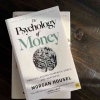1. Muhammad Abduh
Muhammad Abduh (Arabic: ) (Delta Nile, 1849 - Alexandria, 11 July 1905) was a Muslim thinker from Egypt, and one of the initiators of the Islamic modernism movement. He studied philosophy and logic at Al-Azhar University, Cairo, and was also a student of Jamal al-Din al-Afghani, a philosopher and reformer who carried out the Pan-Islamism movement to oppose European occupation in Asian and African countries.
Muhammad Abduh's method of renewal.
In making improvements Muhammad Abduh saw that an improvement did not always come through revolution or similar means. As with anything changes quickly and drastically. But it is also done through improving the method of thought in Muslims. Through education, learning, and moral improvement. Also with the formation of a cultured and thinking society that can make renewal in its religion. So that will create a sense of security and determination in carrying out Islam. Muhammad Abduh considered that this method would require a longer and more complicated time. However, the impact of improvement is greater than through politics and massive changes in realizing an awakening and progress.
The renewal of thought by Muhammad Abduh was not just a rejection individually or globally of existing, previous thinking. The renewal is also not only a maintenance of these existing thoughts. However, the reforms he undertook were an attempt to improve, develop, and make the essence of existing thoughts to fit the demands of the times.
2. Muhammad Iqbal
Muhammad Iqbal is an early Indian poet-philosopher of the 20th century. Inspired by European and Islamic thought, Iqbal rejected both the conception of European progress and the patterns of contemporary Islamic culture in India. He called on "true Muslims" to fight mullahism, mysticism and monarchy, and against foreign ways.
In a broad context, Iqbal called on all humans to rise above traditional Western ways and ideas and technology to find their own creativity, enthusiasm and authenticity.
Iqbal's theory is authentic because it is subject to intuitive verification by a reflective person; this theory is authentically Muslim because, according to him, it is in harmony with the main spirit of the Islamic faith.
Follow Instagram @kompasianacom juga Tiktok @kompasiana biar nggak ketinggalan event seru komunitas dan tips dapat cuan dari Kompasiana. Baca juga cerita inspiratif langsung dari smartphone kamu dengan bergabung di WhatsApp Channel Kompasiana di SINI







